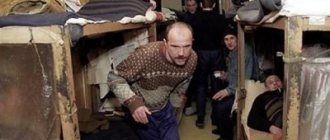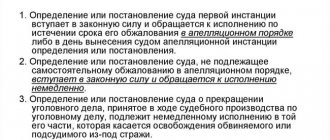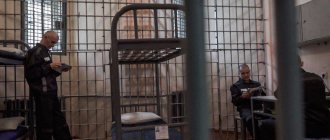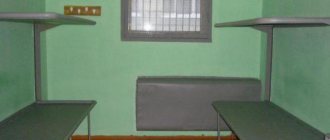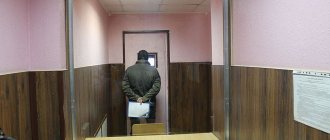Knowledge about the PVR of a pre-trial detention center will help individuals who are in the status of suspects or accused to use their rights to the maximum during their stay in pre-trial detention centers. Recently I was a suspect and did not know what rules I should follow. As a result, my already difficult situation worsened even more. To prevent other individuals from repeating my mistakes, in this article I will talk about temporary temporary residence permits, which are established at the legislative level. In addition, the topic of the daily routine will be touched upon, as well as the provision of additional paid services.
Reception and placement in pre-trial detention centers
Upon presentation of documents, reception is carried out daily, for which a separate duty officer is responsible. The main thing is to have evidence with you that there are grounds for placement in custody. Then the citizen is introduced to his rights and responsibilities, and he must sign the document as a sign of consent.
Free legal consultation
+8 800 100-61-94
For no more than 1 day, those admitted are transferred to the cells of the collection department. Next they move on to sanitary treatment and primary medical examinations.
Clothes and bedding are issued from the internal reservoirs of institutions. Changing clothes remains a mandatory procedure for everyone; in this case, no exceptions are made for anyone. For further placement, they rely on the provisions of No. 103-FZ, drawn up in 1995.
The rules will be as follows:
- Personality and psychological compatibility influence how and who is placed in cells. Smokers and non-smokers are accommodated separately if possible.
- Adults and minors, men and women are kept separately from each other.
- The individual detention of some individuals is also affected by the laws they have violated. The same applies to decisions that have already entered into force or not yet.
Attention! Separate rules apply to those who suffer from infectious diseases or are more susceptible to them than other citizens.
PVR pre-trial detention center with changes for 2022
The Russian Ministry of Justice in 2005 (October 14) approved order number 189. This document is devoted to internal regulations in places such as pre-trial detention centers. Since 2005, the document has been modified several times through amendments. The latest version of the order consists of five main parts. The first paragraph regulates how suspected and accused individuals should behave. The second part of the order contains information about what items and products are allowed to be carried in pre-trial detention centers.
As you know, in a pre-trial detention center you are allowed to have strictly certain items and products with you. The order spells out a list of things that the accused are allowed to receive in parcels, buy with cash, and also keep in their possession.
The third paragraph of the PVR of the pre-trial detention center 189 is intended to fix the rules for the provision of additional services, for a fee, by the accused or suspected people. The next part of the order dictates what the daily routine should be. It should be noted that the approved schedule is approximate. And the last, fifth, part is needed in order to know how to keep a log of proposals put forward by individuals who are in a pre-trial detention center. This paragraph also describes the procedure for filing various applications or complaints.
Internal regulations of the pre-trial detention center
The PVR of pre-trial detention center 189 clearly states how individuals staying in pre-trial detention centers should behave. First of all, it is the responsibility of suspects to comply with the rules of detention. This process is regulated by a special document - Federal Law No. 103, which entered into force on July 15, 1995. Also, suspects must obey various orders issued by the administration of the detention centers.
In addition, cleanliness is very important in a pre-trial detention center. It is necessary to take care not only of compliance with sanitary rules, but also of personal hygiene. Suspected individuals are required to have clean clothes, bed linen, and order in the cell. They must take care of all this on their own. You also need to be familiar with fire safety rules and follow them. Also, individuals staying in isolation wards are required to take care of the property located inside them.
As for cleaning cells, prisoners are required to do this according to a specific schedule. The sequence and schedule for performing these works is approved by the administration. Every time an accused person wakes up in a pre-trial detention center, he is required to make his bed. It is allowed to spread it only after lights out. You must behave with dignity. Any actions that could in any way humiliate other prisoners are strictly prohibited. In addition, it is also necessary to communicate with employees of pre-trial detention centers with respect.
While pre-trial detention center employees are performing their official duties, suspects should not interfere with them. In addition, prisoners should under no circumstances take any actions that pose a threat to the life or health of others. The accused are required to be polite both to other prisoners and to absolutely all employees of the detention center (not just the administration). If a suspect needs to contact a pre-trial detention center officer, he can do this exclusively using “you”.
Please note that prisoners are prohibited from calling detention center workers by name. You can address them exclusively using words such as citizen or citizen.
Rules for the provision of services
In some situations, additional services may be required for inmates. The administration of the detention centers must satisfy these requests, but on a paid basis. This fact is evidenced by Federal Law No. 26, which came into force on July 15, 1995. However, it is worth considering that not all requests are fulfilled, but only the following:
- Repair and maintenance services. If a prisoner's clothing or shoes are broken or his bed linen is torn, repairs can be provided at his request. In addition, suspects may ask to have their clothes washed. It is also possible to provide services such as haircuts or shaving. If necessary, you can even agree to do the styling.
- Medical services. Since health is very important in the life of every person, prisoners can calmly demand that they be provided with some kind of treatment. If there is a need for dental prosthetics, the suspect should also not be denied. In addition, if an individual wishes to consult with a medical professional or undergo an examination, his request must be granted.
- Consultations and delivery. Also, if individuals ask for legal advice or services from a notary (for example, to make and certify copies of documents), then they have every right to do so. Prisoners can also ask for food items to be delivered. In addition, individuals are given the opportunity to order literature.
What should be the daily routine?
Order number 189 of the PVR pre-trial detention center, as amended in 2022, specifies the daily routine of prisoners. A standard day is scheduled by the hour. However, it must be borne in mind that it is not necessary to strictly follow this plan, since it is indicative. The order dictates that prisoners must wake up at approximately six in the morning. Then they are given an hour to go to the toilet and make their beds. The next hour (from seven to eight in the morning) is reserved for breakfast.
After breakfast, isolation center workers conduct a routine check, which takes about two hours. The time from nine in the morning to one in the afternoon can be spent taking part in any investigative actions, various court hearings, as well as a walk. At the end of this time, an hour is given for lunch. Then, from two o'clock in the afternoon until six in the evening, you can again communicate with investigators or participate in meetings, as well as go for walks. Then comes an hour-long dinner. Next, time is given to prepare for bed. As for sleep itself, it should be continuous and begin at ten o’clock in the evening.
What can you take with you?
Suspects are always subject to personal search, this also applies to all things they have with them. Under the direct supervision of a health worker, plaster and other bandages are checked along with plasters and prostheses.
Prisoners are allowed to have the following set of things with them:
- Threads with a needle.
- A food set of condensed milk and salt, onions, garlic and lard.
- TV and boiler.
- Literature, including educational literature.
- Dominos, envelopes and chess pieces, pens and notebooks.
- Traditional, personal prescription medications.
- Flip-flops with bed linen and towel.
- A washcloth with toilet paper, disposable razors or an electric razor, toothpaste and a brush.
- Spoon, mug, bowl.
Reference! You are allowed to take things with you whose total weight does not exceed 30 kilograms. You cannot do without an identity document. This is a minimum set that helps you get through the time until the first gears.
Payment order
Payment for goods from the pre-trial detention center store is carried out in the detention center itself or online through the ordering system on the website of the Federal Penitentiary Service of the Russian Federation.
You can donate food, essential items and cigarettes. The advantage of purchasing this in a pre-trial detention center store is that the food is sent to the prisoner without inspection or with inspection using a metal detector. That is, the packaging is not torn unless the metal detector shows the presence of prohibited items in it. In this case, the package will be cut, its contents will be checked, and then it will be transferred to another container.
The disadvantage of this method of collecting parcels is that the cost of food and items in the pre-trial detention center kiosk is higher than in regular stores.
Sometimes relatives of prisoners complain that the administration of pre-trial detention centers forces them to buy cigarettes in the pre-trial detention center store, without accepting the cigarettes they brought with them. This is a violation of the law and a complaint can be filed against the actions of the detention center staff.
Material and household support
All prisoners are provided with a minimum set of personal items, including the following items:
- Books, magazines from the library.
- Seasonal clothing if you don’t have your own.
- Dinnerware and all necessary utensils.
- Bed sheets.
- Bed dress.
- Sleeping area.
During the period of detention, these items are transferred free of charge.
With a separate application, they may additionally submit:
- Products to help care for children.
- Knives for cutting food, scissors and needles, but under supervision from employees or administration.
- Items to clean the camera.
- Board games.
- Periodicals.
- Toilet paper.
- Laundry soap.
- Personal hygiene products.
- Disposable razors.
- Toothpastes.
- Brushes.
- Soap.
Additionally, technical support is provided. This applies to bunk or single beds, televisions and boilers. Garbage cans and basins, special bowls for washing, heating devices, tanks with drinking water - these are just some of the items that are provided upon request if necessary.
Important! Sanitation is carried out at least every week.
Reconciliation and payment through the financial part of the pre-trial detention center
Clause 68 of the PVR determines the procedure for verifying the weight of the transmission and its payroll. Now additionally required:
- Present the document of the person delivering the parcel before checking its contents.
- The presence of the one who brought the message.
- Use of special equipment to inspect transfers.
- Ensure the safety of the contents of the transmission.
- Follow the rules of industrial and personal hygiene.
If prohibited items are found in the transfer, the pre-trial detention center employees have the right to draw up documents to bring the perpetrator of the attempt to transfer them to administrative or criminal liability.
Gears
Parcels are accepted only inside special premises that are designed specifically for this purpose. In compliance with all sanitary and hygienic standards, inspection of all things transmitted and received through this department has become mandatory.
Special acts are drawn up when the parcel is opened and the items present are checked. A commission consisting of at least three people must be present. All items that are prohibited from storage and use are destroyed or returned to the sender.
We can briefly list those things that are prohibited for transfer:
- Disposable machines, needles.
- Razors.
- Deodorants.
- Ropes and laces, belts.
- Dishes made of glass or porcelain.
- Spoons based on stainless steel.
- Knives.
- Homemade meat preparations.
- Glass containers in which preserved food is stored.
- Products with short shelf life.
- Home cooked food.
- Alcohol.
All parcels are carefully cut and unpacked, and a metal detector is additionally used for inspection. Homemade food and gifts may be accepted on site.
Possibility of ordering transfer
Paragraph 77 of the temporary residence permit, as of today, allows you to pay for goods through the financial part of the pre-trial detention center. This eliminates the need to carry the transfer personally. All goods will be transferred to the prisoner from the store of the detention center. At the same time, their inspection will be simplified as much as possible and many goods will arrive in their original packaging, which does not happen when inspecting such goods transferred from the outside.
To pay for the transfer you need:
- Draw up an application (in 3 copies), indicating the list of products, their quantity and weight.
- Pay for the ordered goods.
One copy of the application will be given to the sender of the transfer after it is received by the prisoner. The second will be filed in the prisoner’s personal file, and the third in the nomenklatura file, which is kept for 5 years after his departure.
Prisoner's personal account
Some prisoners actually have personal accounts. More often, funds from these accounts are used to pay for additional services. Any money and, in principle, valuables are prohibited on the territory of correctional institutions.
Citizens can open a separate account when confinement is just beginning. All finances that were before the arrest are transferred to this account. Everything that comes from relatives and other persons is transferred there. A separate contract is required.
The accounting department at the place where the citizen is currently located is responsible for opening such an account. Postal orders are acceptable. Then the accounting department of the institution performs almost all actions automatically.
Sending letters
It is allowed to send any number of telegrams or letters to the accused himself. If they are addressed to his young children, then it is possible not to indicate the address of the pre-trial detention center as the address, so as not to traumatize the child’s psyche.
All correspondence undergoes a mandatory censorship procedure. Received letters must also pass through it to reach the prisoners. This includes both those received by mail and those sent over the Internet.
As for money transfers, they are made upon application addressed to the head of the pre-trial detention center, by mail, and then credited to the citizen’s personal account.
Dating in the isolation ward
Prisoners are allowed visits twice a month, with a maximum duration of up to 3 hours. Each of these activities requires a full permit. All persons who are allowed to undergo the procedure are registered separately.
All persons who come to visit their loved one are also informed about the established requirements. All citizens understand responsibility for any violations and accept it.
Dates are organized in specialized rooms, and the process is monitored by uniformed staff. In addition to dating, there is communication through letters; it is possible to send messages both on paper and electronically.
What to do if cigarettes break?
When transferring cigarettes, there were often violations on the part of the administration. During inspection, its employees are obliged to ensure the safety of transferred products and things, but often this requirement was not observed.
After the 2016 PVR changes, the situation was supposed to change, but violations still remained. The PVR contains paragraph 78, according to which the administration must monitor the safety of transferred goods, but at the same time it is exempt from liability in the event of:
- Food spoilage due to long-term storage.
- Their damage during inspection.
These nuances are used to force people to buy cigarettes at a kiosk in a pre-trial detention center, where they are sold at a huge markup. That is, during the search, cigarettes are broken, and the prisoner’s relative has no choice but to buy new ones at the stall.
You can try to combat this by contacting human rights organizations.
Cell phone use
Such devices are prohibited for use in cameras. Conversations are allowed only through the official line, which is fully controlled by representatives of the institution. Regulatory authorities issue written permission every time you come into contact with the outside world. When using foreign languages and transmitting information that may be harmful, they have the right to interrupt the conversation.
In principle, electronic gadgets for daily use are allowed. But the devices must be on balance in the pre-trial detention center. It is important that there is no Internet access.
It is also useful to read: Telephone calls and money transfers for prisoners with the Zonatelecom operator
What legislative acts establish temporary temporary detention centers in pre-trial detention centers?
The internal regulations of pre-trial detention centers are established by Order of the Ministry of Justice No. 189 of October 14, 2005. Of course, changes are made there from time to time. The latter were carried out on May 12, 2022.
The temporary temporary residence permit in a pre-trial detention center is established by Order of the Ministry of Justice No. 189.
It consists of 20 chapters, each of which is devoted to a different aspect of the prisoner's life. They explain how the life of convicts should be organized, what they are allowed and prohibited from doing, what things can be stored and what cannot be stored. In the following sections we will try to talk separately about each of them.
Medical service
A medical examination is carried out for each person who enters the isolation ward. Only medical permission is required for a person to enter a general cell. Before the inspection, a separate cell is used to hold the citizen.
The medical unit of such institutions is equipped with the following capabilities:
- Inpatient care for sick people.
- Conducting surveys and analyses.
- Ambulatory treatment.
To avoid harm to the health and lives of other people, patients can be isolated. Examinations and treatment, if necessary, are carried out if the citizen has filed a corresponding complaint. Separate cells are needed for people who have contracted dangerous diseases.
Signs of diseases that affect the maintenance regime are identified during the initial examination. Some of the problems are sufficient for a citizen to be released from detention. But to confirm such diagnoses, a whole commission is assembled from doctors. A separate decision is made according to which a medical examination is organized for a specific person.
Buying books and storing literature
The PVR now has clause 125.1, according to which:
- You can borrow books and periodicals from the detention center library.
- Use literature and periodicals purchased through the administration.
The second option involves contacting the administration of the pre-trial detention center and going through a special procedure. It consists of:
- In filing an application with a request to withdraw money from the prisoner’s personal account to purchase a book in a retail chain.
- Checking the availability of the required amount in the prisoner’s account, about which a note is made on the application.
- Sending an application to the head of the pre-trial detention center.
- The boss makes a decision to approve or deny the application.
Since May 23, 2016, it has become possible to simplify this procedure. Now relatives can send books to prisoners.

